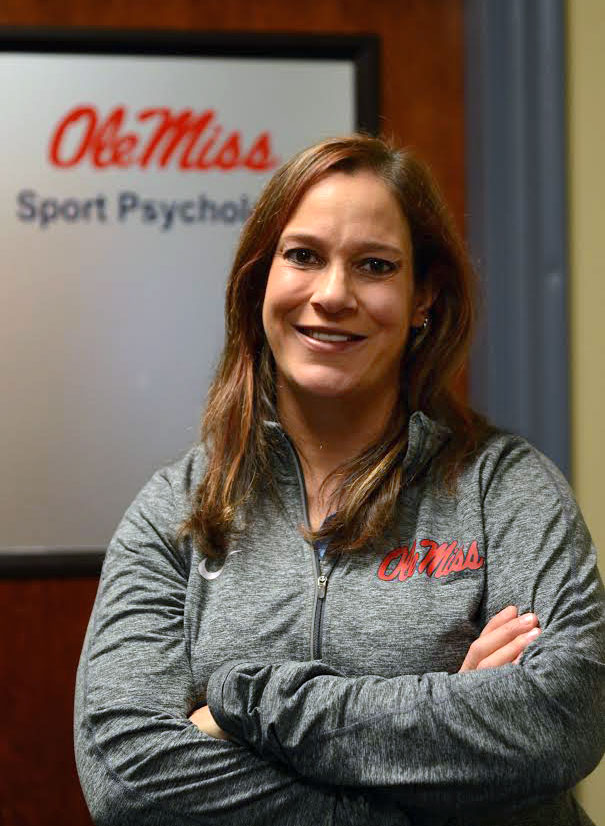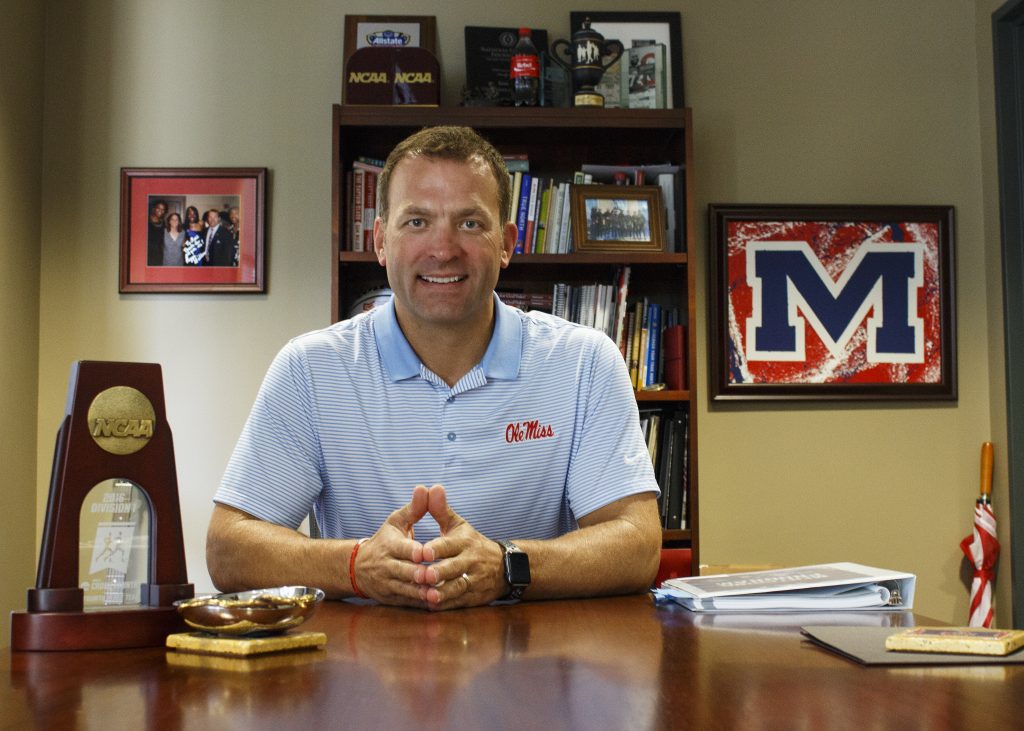Classes, relationships and identity struggles fill the everyday lives of college students across the country. The American College Health Association found in 2013 that 57 percent of female college students and 40 percent of male college students reported feeling “overwhelming anxiety” within the previous year. That same study indicated that roughly 30 percent of college students reported symptoms of depression.
But there are students – those with all the aforementioned responsibilities – who also wake up early each morning for training and stay up late at night watching film. There are students who spend every weekend on the road or flying to their next match.

UM Sports Psychologist Josie Nicholson stands in front of her office in the FedEx Center on Tuesday. Photo by Alexis T. Rhoden
Student-athletes make up less than 2 percent of the roughly more than 20,000-person Ole Miss student body, but they have their own full-time sports psychology staff. It’s no surprise why.
“[It’s] the stress of time management,” Ole Miss Athletics Director Ross Bjork said. “Weight workouts, practice, nutrition, study hall, class, team travel.”
The stress on Ole Miss athletes, in particular, Bjork points out, tends to be greater than most.
“We have the SEC Network, and we have ESPN,” Bjork said. “There’s a pressure to perform.”
Ole Miss sports psychologist Josie Nicholson agrees. Nicholson, who received her master’s degree and doctorate. in counseling psychology from the University of Southern Mississippi, has a long history of providing mental health care in a variety of settings.
“Typically, people don’t understand that when [student-athletes] say, ‘I don’t have an hour in my day,’ they honest-to-God mean it,” Nicholson said. “With athletes, the No. 1 issue is just coping with the pressure and the stress from the demands that are placed on them.”

Athletic Director Ross Bjork in his office Aug. 25, 2017. Photo by Billy Schuerman
That’s why Ole Miss hired Nicholson in 2012. As a sports and counseling psychologist, she helps student-athletes deal with mental health concerns both related and unrelated to their sport. Nicholson provides a wide variety of services for student-athletes participating in any sport at Ole Miss.
“Athletes can come to me individually, they can shoot me a text, they can shoot me an email or they can go through an athletic trainer or coach,” Nicholson said. “I also do team stuff. That mainly comes through coaches, but sometimes the team will request it.”
When the Athletics Department transitioned Nicholson into a full-time position in 2013, Ole Miss was one of only three SEC schools with a full-time sports psychologist on staff.
“We get phone calls all the time – both within the SEC and across the country – about our health and sports performance model,” Bjork said. “I think we were on the cutting edge six years ago in creating that model.”
Now, as the spotlight on mental health care shifts to collegiate athletes, many schools are being forced to play catch-up.
“Each athletics department must be very explicit in the way that they are providing those resources to their athletes, and yet that’s a huge challenge for Millsaps or Belhaven,” Nicholson said. “There’s not enough of us. It’s a very niche field.”
The Ole Miss sports psychology staff – currently composed of Nicholson and a doctoral fellow – are responsible for the mental healthcare of around 400 student-athletes at any given time.
Bjork understands not only the staffing crisis but also the difficulty in attaining further funding for the program. Still, he hopes the staff will continue to grow in number.
“Right now, I think it’s safe to say we’re short-handed,” Bjork said. “And so there needs to be more done, but that does take resources. I think everyone is trying to be creative and come up with new ways to fund this.”
Bjork will be the featured speaker at a fundraiser event for the William Magee Center for Wellness Education tomorrow night. The center plans to open its doors later this year and is hoping the dinner will provide a final funding push to meet its $1.5 million goal.
The center is named for former student William Magee, who died of an accidental drug overdose soon after graduating from the university. While in school at Ole Miss, Magee was a member of the Ole Miss Track and Field teams. Magee’s parents, David and Kent, moved back to Oxford after his death and David began working as publisher of the Oxford Eagle.
“I reached out to David when he first got here working for the Oxford Eagle, just to get to know him and he told me the story,” Bjork said. “I didn’t understand the story until David had mentioned it.”
Magee died before Bjork stepped into his current position on campus, and the two never met, but Bjork said that didn’t stop him from relating with the Magee family’s story.
“The connection for me personally was through David, and William being a student athlete, so let’s try and partner with this,” Bjork. “This is a need on campus, for students and the university community.”






